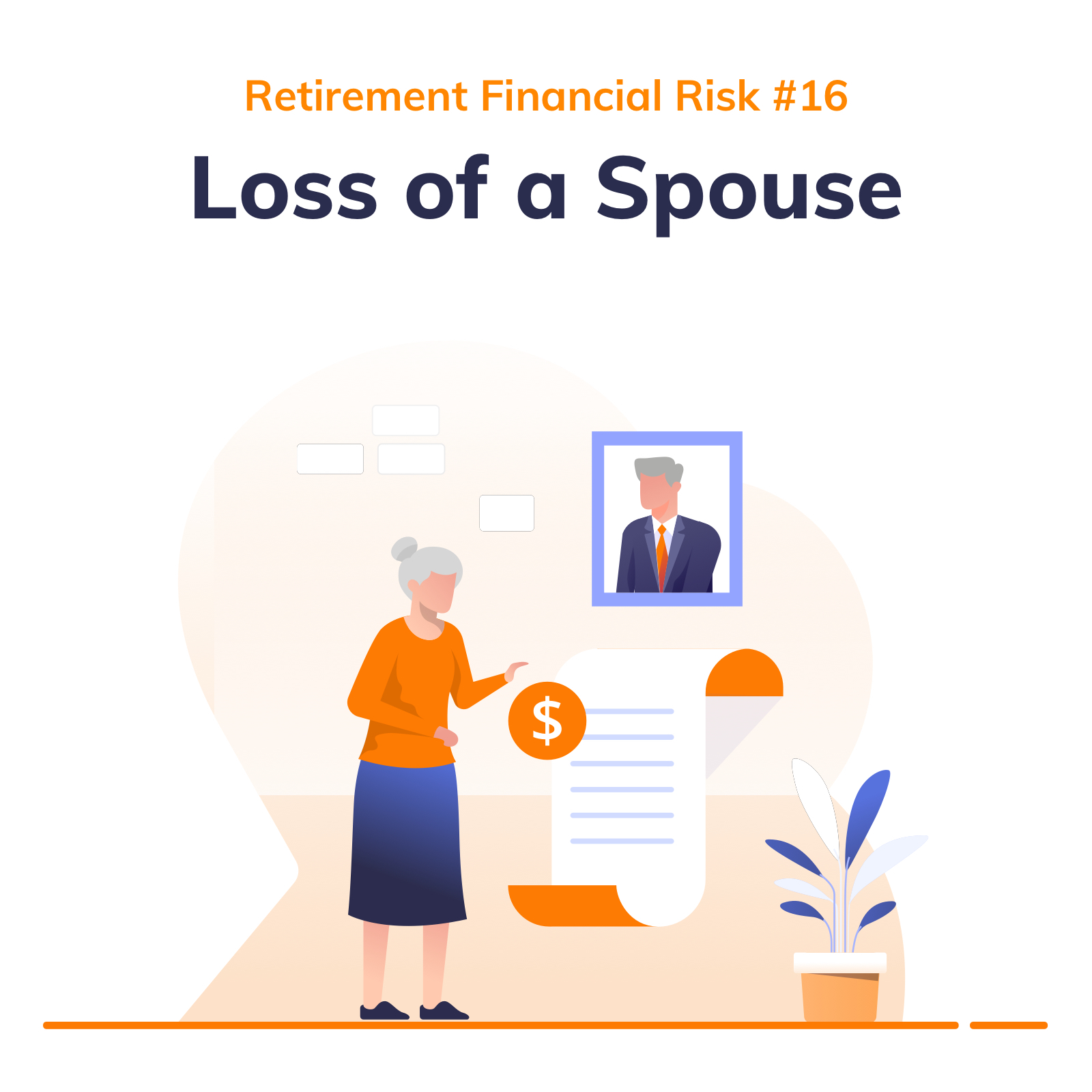Retirement Risk #16: Loss of a Spouse — How to Help Plan for the Unimaginable
Losing a Spouse in Retirement Can Have Financial Impacts, Too
No one wants to think about what would happen if a spouse passes away. However, in retirement, it will likely happen at some point. There are steps retirees can take now to help prepare.
“Unfortunately, losing a spouse is likely to result in an income loss. Plans should be made for decreases in Social Security payments, pensions, and other income sources.”
— Eric Stratton, Heyday founder
Some retirees may be shocked to discover how the devastating loss of a spouse can be compounded by negative financial impacts, including:
Income taxes
If your spouse dies, you’ll need to file as a single taxpayer on your income taxes the following year. This change can have significant financial effects, including a decrease in the deductions that can be claimed.
For example, the 2020 standard deduction amounts are:
- Single: $12,400
- Married filing jointly: $24,800
That’s half the deduction married retirees are accustomed to receiving! Consulting with your tax advisor is always a good idea, as this article is not intended to provide specific tax advice.
Pension payments
Depending on how any pensions were set up, some payments may stop completely when the spouse who earned the pension passes. Others may be set up to provide a reduced rate of survivorship benefits — which could be half of what the payment was when the pension-earning spouse was living. For widows and widowers who rely on the full monthly benefit, this can create a cash flow problem.
Social Security benefits
The amount you receive from Social Security will vary greatly from person to person because it’s based on several factors:
- Your current age
- Your full retirement age
- Age when you begin claiming Social Security benefits
- Work and salary history
- If you’re married, when your spouse began claiming benefits
It’s a common misperception that we get to keep both monthly checks if our spouse dies. That isn’t the case in most situations. As a general rule:
- If the surviving spouse has already reached full retirement age, he or she is eligible to receive 100 percent of the deceased spouse’s Social Security benefits with one requirement... The survivor isn’t already receiving their own Social Security benefits.
- If the surviving spouse is already receiving their own Social Security benefits, they can only apply for benefits as a widow or widower if their current total is less than what they would receive as a survivor.
- If the surviving spouse is at least 60 but hasn’t reached full retirement age, he or she will receive a portion of the deceased spouse’s benefit.
To learn how your specific circumstances determine your benefit, visit SSA.gov.
Monthly expenses
Day-to-day living expenses may be reduced slightly when one spouse passes. However, some clients we’ve worked with were surprised to see how the majority of their bills stayed the same in this situation. Mortgages, utility bills and property taxes are a few examples of bills that will remain relatively the same. While groceries, entertainment and transportation costs will decline in most cases.
How might retirees address the unpleasant possibility of losing a spouse?
- Ignore the issue - some may choose to assume things will stay the same, not realizing just how many aspects of their finances may change if one spouse passes away. At Heyday, we strongly recommend you speak with your spouse and a financial professional about the impact on the surviving spouse if one of you passes.
- Retire but reduce their lifestyle - the fear of running out of money is usually front and center for retirees. And the thought of having any retirement income reduced due to the loss of a spouse can motivate some to cut all discretionary spending in retirement. However, this may not be enough to prevent the surviving spouse from outliving their savings — and it could result in a retirement that falls short of what either of you imagined.
- Delay retirement to add more to retirement accounts - using later working years to bolster retirement savings can help achieve that goal, but it may come at a price — time. For retirees, their early years are often the most active, when they have more energy and mobility. As they grow older, they may become less likely to take those trips and pursue those retirement dreams due to declining health.
Consider this example:
David and Linda are in their mid-sixties and retired. As David is starting to slow down, he begins thinking about what would happen to Linda if he passed away. He wants to make sure she can remain in their home and stay financially independent — without worrying about running out of money or relying on their children for help when he’s gone.
Fortunately, there are ways he can prepare now to provide Linda with the stability she needs. Our recommended first step is completing an online retirement risk assessment.
Pre-retirees and retirees can take advantage of free tools like Heyday’s Custom Retirement Review to see how far their assets may go in retirement (and how to help make them go farther).
Ready to see how at-risk your retirement may be? Get your custom retirement review here.

Written by Cindy Collins
Forbes Contributor & Retirement Financial Professional
Cindy Collins is a Heyday Retirement contributor with over 30 years of experience in personal financial services.

About Heyday
Heyday is a premier source for comprehensive tools and informative content designed to help retirees build a secure retirement income plan.
Subscribe
Stay in the know on a wide range of retirement topics.








